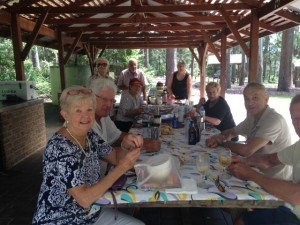Move your body: One of the best brain exercises is physical exercise. The most physically active people have the lowest risk of cognitive decline. Exercise increases blood flow to your brain, can stimulate the birth of new brain cells, and strengthens the connections between pre-existing neurons. A daily walk in nature is a powerful mood-lifter, reduces stress, and promotes healthy immune responses. 
Go back to school: Rich educational experiences or engaging in mentally challenging occupations have a major influence on how you age cognitively. This is because mentally stimulating activities help build cognitive reserve. The present-day opportunities available for low-cost or free on-going education both in-person and online are enormous.
Cultivate curiosity: Curiosity is a state of active interest or genuinely wanting to know more about something. The brain circuits involved in curiosity influence and interact with brain circuits that govern learning and memory. This means that being extra curious and interested in what you’re learning induces a motivational state that enables you to better learn other things too.
Make music: Playing a musical instrument engages many aspects of brain function and requires a host of sensory, cognitive, and motor skills. If you play a musical instrument, challenge yourself to learn a complex new piece. Never learned as a child? Adults have some key advantages over children when it comes to learning how to play an instrument: not only do adults want to learn, they have the ability to tackle complex abstract concepts, and the focus and discipline to put in the practice required for mastery.
Be adventurous: Lab mice kept in bare cages with no toys or places to explore show greater rates of age-related cognitive decline compared to their counterparts kept in enriched novel environments full of toys, tunnels and mazes. Humans are no different. People who stay physically and mentally actively engaged in life and constantly challenge themselves to step out of their comfort zone have a reduced risk of age-related cognitive decline.
Play games: Adults tend to play less and take life more seriously than kids. But you don’t lose the need for novelty and pleasure once you grow up. Game playing, whether it be video or online, traditional board games, or team or individual sports, has been shown to alleviate boredom, anxiety, depression, loneliness, despair and even physical pain.
Share your wisdom: Knowledge alone is not useful unless you can make connections, or connect the dots, between what you know. Wisdom is gained from experience and can also be shared. Share your wisdom, skills and experience with younger people by finding opportunities for mentoring, teaching or coaching.
Get crafty: The rhythmic and repetitive nature of yarn crafts, drawing, painting or even throwing a clay pot is calming, comforting and contemplative. It’s not a stretch for you to imagine crafting as a mindfulness practice, or form of meditation. Perhaps this explains the current boom in adult colouring books? Crafting is intrinsically creative, but also develops hand-eye coordination, spatial awareness and fine motor skills. It also involves problem solving, memory formation and retrieval.
Connect with others: People who participate in high numbers of different leisure activities such as going to clubs, visiting friends, playing cards, and community or volunteer work have a lower risk of developing dementia. Conversely, loneliness is associated with more than double the risk of developing dementia.
Believe in you: Accumulating evidence suggests that people who consider themselves to be old and frail are more likely to abandon activities that can keep them healthy in old age. Think yourself young by remaining socially, mentally and physically active. As the saying goes, age isn’t a number but an attitude.
These tips were provided by Dr Sarah McKay, a neuroscientist who writes lots of interesting articles about our brains on www.yourbrainhealth.com.au
